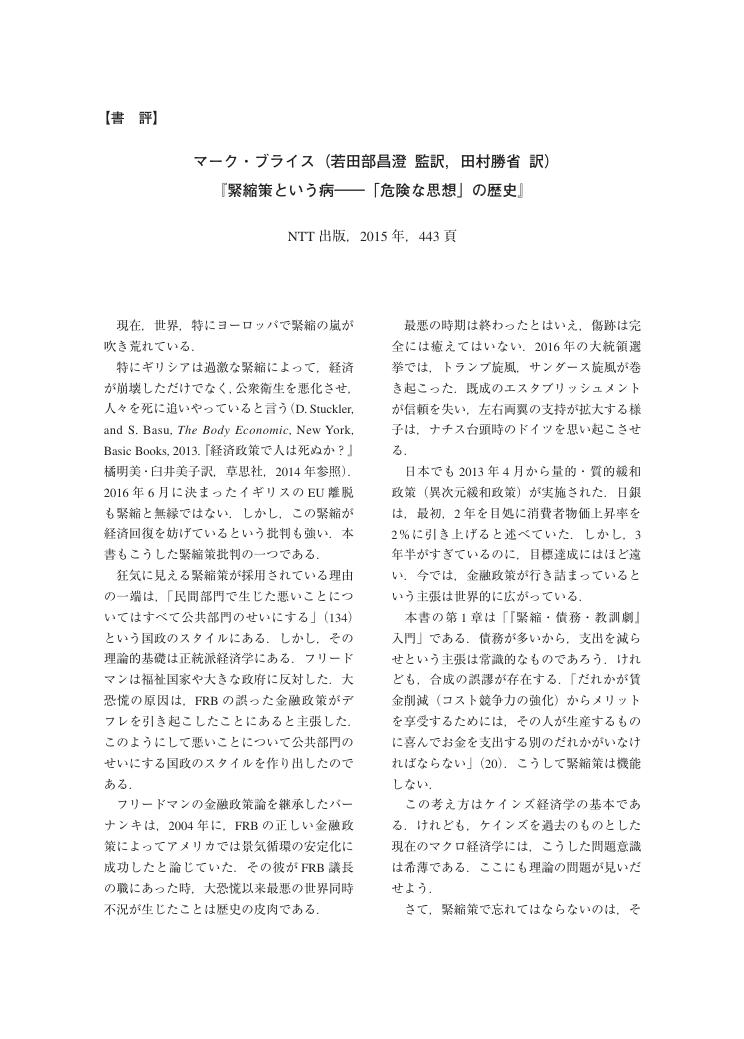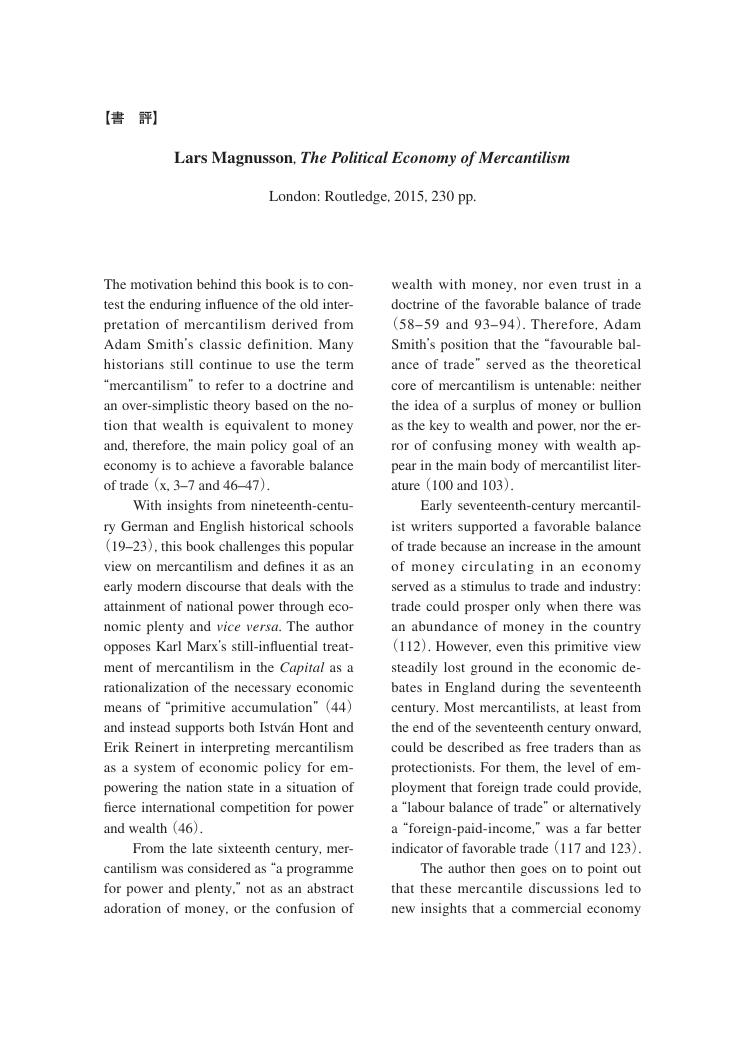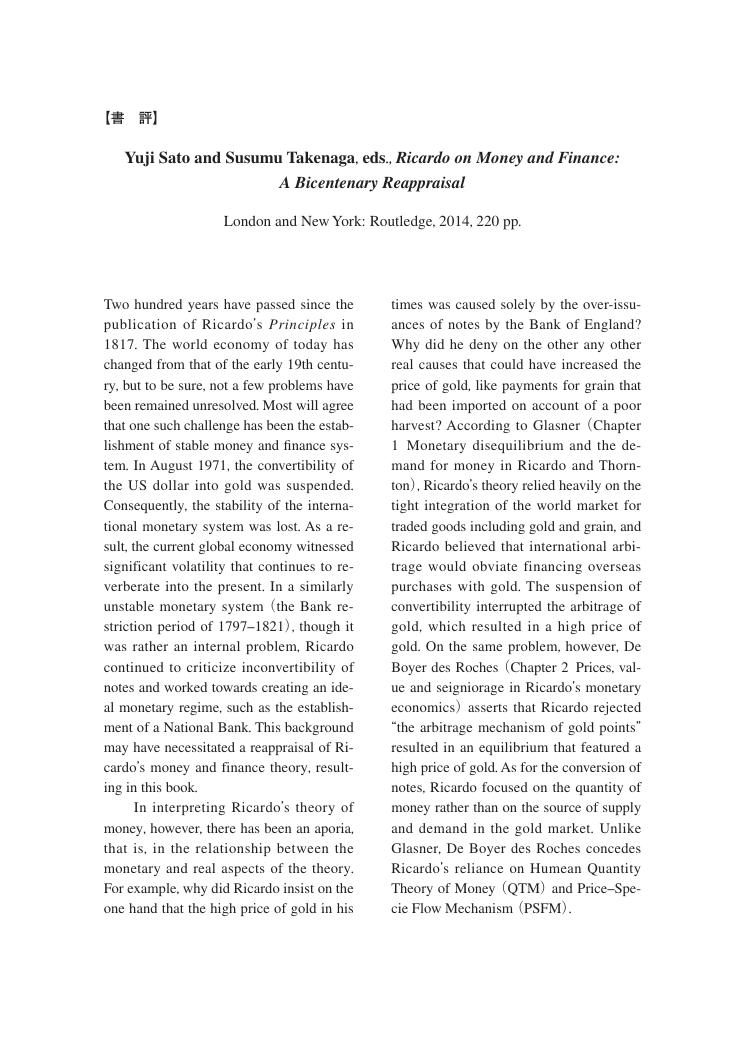- 著者
- 藤原 辰史
- 出版者
- 経済学史学会
- 雑誌
- 経済学史研究 (ISSN:18803164)
- 巻号頁・発行日
- vol.58, no.2, pp.80-82, 2017 (Released:2019-11-30)
- 著者
- 服部 茂幸
- 出版者
- 経済学史学会
- 雑誌
- 経済学史研究 (ISSN:18803164)
- 巻号頁・発行日
- vol.58, no.2, pp.83-85, 2017 (Released:2019-11-30)
- 著者
- 桑田 学
- 出版者
- 経済学史学会
- 雑誌
- 経済学史研究 (ISSN:18803164)
- 巻号頁・発行日
- vol.58, no.2, pp.34-36, 2017 (Released:2019-11-30)
- 著者
- 内藤 敦之
- 出版者
- 経済学史学会
- 雑誌
- 経済学史研究 (ISSN:18803164)
- 巻号頁・発行日
- vol.58, no.2, pp.37-39, 2017 (Released:2019-11-30)
- 著者
- 西川 輝
- 出版者
- 経済学史学会
- 雑誌
- 経済学史研究 (ISSN:18803164)
- 巻号頁・発行日
- vol.58, no.2, pp.40-42, 2017 (Released:2019-11-30)
- 著者
- 古家 弘幸
- 出版者
- The Japanease Society for the History of Economic Thought
- 雑誌
- 経済学史研究 (ISSN:18803164)
- 巻号頁・発行日
- vol.58, no.2, pp.43-44, 2017 (Released:2019-11-30)
- 著者
- 千賀 重義
- 出版者
- The Japanease Society for the History of Economic Thought
- 雑誌
- 経済学史研究 (ISSN:18803164)
- 巻号頁・発行日
- vol.58, no.2, pp.45-47, 2017 (Released:2019-11-30)
1 0 0 0 OA Ryu Susato, Hume’s Sceptical Enlightenment. Edinburgh: Edinburgh University Press, 2015, xii+348 pp.
- 著者
- 森 直人
- 出版者
- The Japanease Society for the History of Economic Thought
- 雑誌
- 経済学史研究 (ISSN:18803164)
- 巻号頁・発行日
- vol.58, no.2, pp.48-50, 2017 (Released:2019-11-30)
1 0 0 0 OA 内田 弘『 『資本論』のシンメトリー』社会評論社,2015年,410頁
- 著者
- 沖 公祐
- 出版者
- 経済学史学会
- 雑誌
- 経済学史研究 (ISSN:18803164)
- 巻号頁・発行日
- vol.58, no.2, pp.54-56, 2017 (Released:2019-11-30)
1 0 0 0 OA 旧帝国主義批判の書としての『国富論』
- 著者
- 山田 鋭夫 Robert Chapeskie
- 出版者
- The Japanease Society for the History of Economic Thought
- 雑誌
- 経済学史研究 (ISSN:18803164)
- 巻号頁・発行日
- vol.58, no.2, pp.1-23, 2017 (Released:2019-08-31)
- 被引用文献数
- 3
Introduction by Toshio Yamada This text was originally a chapter in Yoshihiko Uchidaʼs (1913-1989) first book, The Birth of Economic Science (hereafter referred to as “Birth”), Tokyo: Mirai-sha Publishers, 1953, and was later included in Collected Works of Yoshi-hiko Uchida, vol. 1, Tokyo: Iwanami Shoten, Publishers, 1989. Birth was pub-lished eight years after Japanʼs defeat in World War II, in the era of chaos and hope that followed this conflict. It has been widely read by generations of social scientists, and is now considered one of the greatest masterpieces in the study of Adam Smith in Japan. Following its somewhat lengthy “Introduction,” Uchidaʼs Birth is construct-ed in two parts: Part One, “The Birth of Economic Science: Wealth of Nations as a Critique of the Old Imperial System” and Part Two, “Analysis of the Sys-tem of Wealth of Nations.” In Part One, Uchida depicts the birth of economic science in Smith not as an extension of political economy after the mercantile system but rather as a critical response to the examination of civil society found in thinkers such as John Locke, David Hume and above all Jean-Jacques Rous-seau, thus bringing into sharp relief Adam Smith as a thinker who criticized mercantilist “modernization from above.” In Part Two, starting with an examina-tion of Smithʼs concept of civil society and theory of the division of labor, Uchi-da analyzes his theories of value, surplus value, and capital accumulation and reproduction by contrasting them with those of Karl Marx. For a more detailed outline of Birth, see Sakamoto (2017).
1 0 0 0 OA OBITUARY: Tiziano Raffaelli (1950-2016)
- 著者
- 近藤 真司
- 出版者
- The Japanease Society for the History of Economic Thought
- 雑誌
- 経済学史研究 (ISSN:18803164)
- 巻号頁・発行日
- vol.58, no.2, pp.24-27, 2017 (Released:2019-08-31)
- 著者
- 竹永 進
- 出版者
- 経済学史学会
- 雑誌
- 経済学史研究 (ISSN:18803164)
- 巻号頁・発行日
- vol.58, no.2, pp.28-30, 2017 (Released:2019-11-30)
1 0 0 0 OA Nahid Aslanbeigui and Guy Oakes, Arthur Cecil Pigou. New York: Palgrave Macmillan, 2015, x+309 pp.
- 著者
- 吉原 千鶴
- 出版者
- 経済学史学会
- 雑誌
- 経済学史研究 (ISSN:18803164)
- 巻号頁・発行日
- vol.58, no.2, pp.31-33, 2017 (Released:2019-11-30)
- 著者
- 青木 裕子
- 出版者
- 経済学史学会
- 雑誌
- 経済学史研究 (ISSN:18803164)
- 巻号頁・発行日
- vol.58, no.1, pp.167-168, 2016 (Released:2019-11-29)
1 0 0 0 OA 橋本努編『現代の経済思想』勁草書房,2014年,xvii+623頁
- 著者
- 大黒 弘慈
- 出版者
- 経済学史学会
- 雑誌
- 経済学史研究 (ISSN:18803164)
- 巻号頁・発行日
- vol.58, no.1, pp.169-170, 2016 (Released:2019-11-29)
- 著者
- 本郷 亮
- 出版者
- 経済学史学会
- 雑誌
- 経済学史研究 (ISSN:18803164)
- 巻号頁・発行日
- vol.58, no.1, pp.171-172, 2016 (Released:2019-11-29)
- 著者
- 音無 通宏
- 出版者
- 経済学史学会
- 雑誌
- 経済学史研究 (ISSN:18803164)
- 巻号頁・発行日
- vol.58, no.1, pp.173-174, 2016 (Released:2019-11-29)
- 著者
- 笠井 高人
- 出版者
- 経済学史学会
- 雑誌
- 経済学史研究 (ISSN:18803164)
- 巻号頁・発行日
- vol.58, no.1, pp.175-176, 2016 (Released:2019-11-29)
- 著者
- 田中 秀臣
- 出版者
- 経済学史学会
- 雑誌
- 経済学史研究 (ISSN:18803164)
- 巻号頁・発行日
- vol.58, no.1, pp.177-178, 2016 (Released:2019-11-29)


















